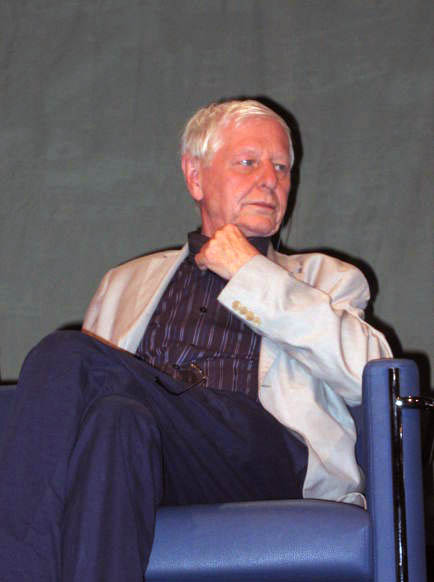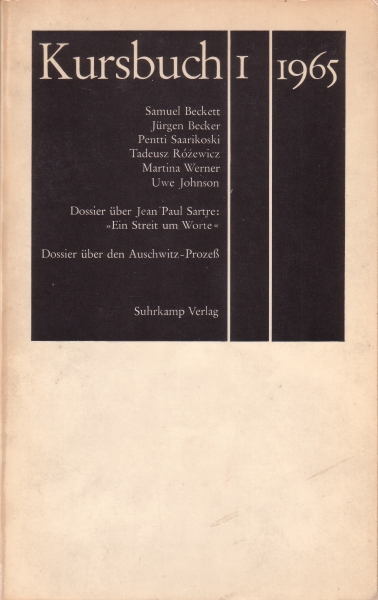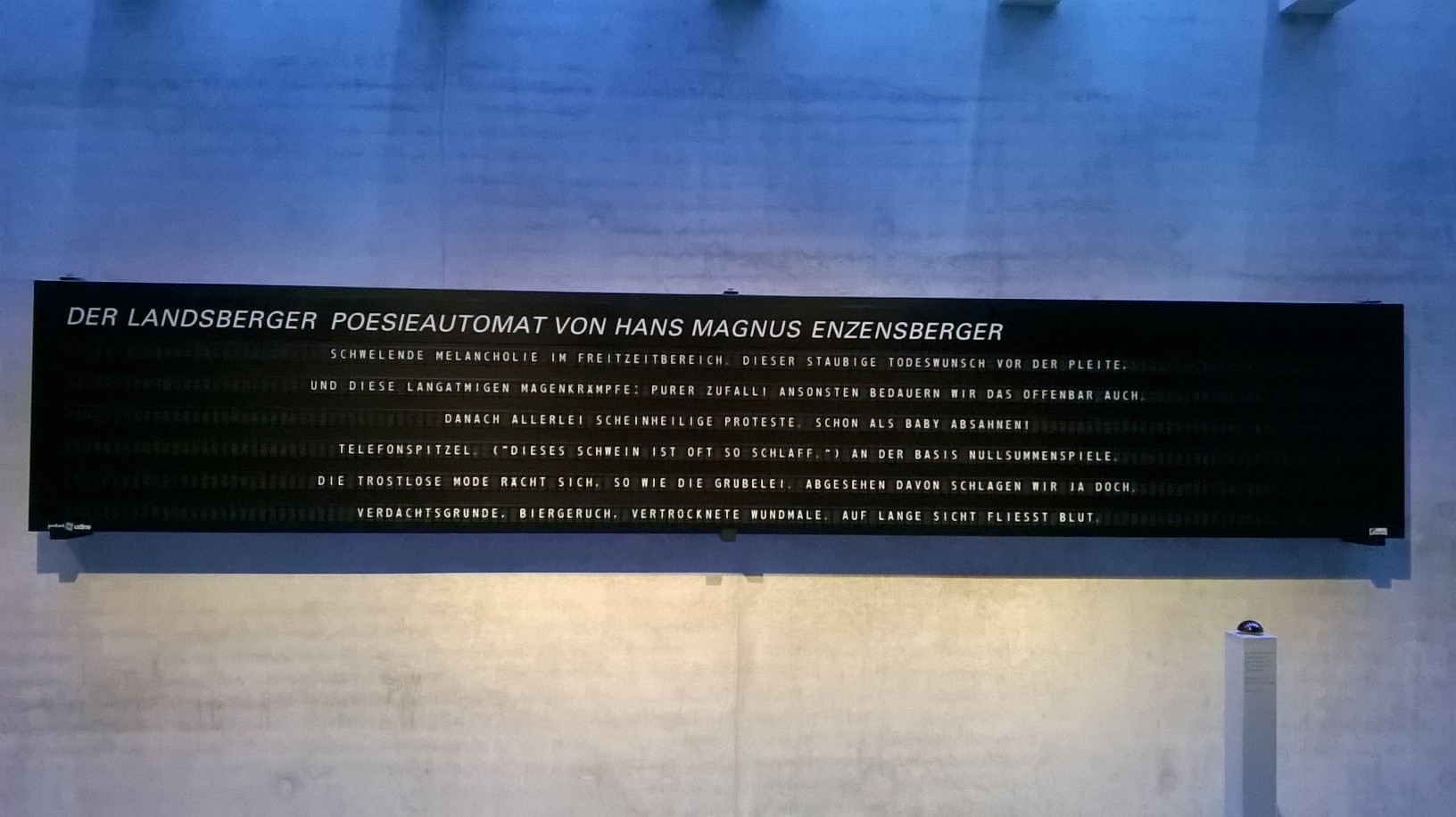1. Overview
Hans Magnus Enzensberger (1929-2022) was a highly influential German author, poet, translator, and editor, regarded as one of the seminal literary figures of the Federal Republic of Germany. Writing also under pseudonyms such as Andreas Thalmayr, Elisabeth Ambras, Linda Quilt, and Giorgio Pellizzi, Enzensberger penned over 70 books that have been translated into more than 40 languages. His work consistently adopted a critical and socially conscious intellectual perspective, making him a pivotal voice in post-war German culture. He was a leading member of Group 47 and significantly influenced the West German student movement of 1968. Throughout his prolific career, Enzensberger was recognized with numerous prestigious accolades, including the Georg Büchner Prize and the Pour le Mérite.

2. Life
Hans Magnus Enzensberger's life was marked by his profound engagement with the political and cultural shifts of his time, which profoundly shaped his literary and intellectual contributions.
2.1. Early Life and Education
Hans Magnus Enzensberger was born on November 11, 1929, in Kaufbeuren, a small town in Bavaria, Germany. He was the eldest of four boys; his father, Andreas Enzensberger, worked as a telecommunications technician, and his mother, Leonore (Ledermann) Enzensberger, was a kindergarten teacher. His early childhood was spent in Nuremberg, where his family moved in 1931. Notably, Julius Streicher, the founder and publisher of the vehemently antisemitic Der Stürmer, was their next-door neighbor. Enzensberger belonged to the last generation of German intellectuals whose writing was directly shaped by their firsthand experiences of Nazi Germany, alongside contemporaries such as Günter Grass, Martin Walser, and Jürgen Habermas. In his teens, he joined the Hitler Youth but was soon expelled due to his inability to conform, a trait he later attributed to his character, stating, "I have always been incapable of being a good comrade. I can't stay in line. It's not in my character. It may be a defect, but I can't help it."
After completing his Abitur in Nördlingen in 1949, Enzensberger pursued higher education, studying literature and philosophy at various universities. He attended the University of Erlangen, the University of Freiburg, and the University of Hamburg. His academic journey also took him to the Sorbonne in Paris. He earned his doctorate in 1955 with a thesis focusing on the poetry of Clemens Brentano.
2.2. Early Career and Literary Debut
Following his doctoral studies, Enzensberger began his professional career, working as a radio editor in Stuttgart until 1957, where he collaborated with Alfred Andersch. During this period, he notably published a radio essay criticizing the language style of Der Spiegel. He quickly became one of the leading authors within the influential Group 47, an organization that played a crucial role in shaping the cultural landscape of post-World War II Germany. In 1957, Enzensberger began an extensive exchange of letters with fellow Group 47 member Ingeborg Bachmann.
His first literary publication, the poetry collection verteidigung der wölfe (Defense of the Wolves), appeared in 1957, followed by landessprache in 1960. Both collections were originally published entirely in lowercase, a stylistic choice that became characteristic of his early work. These poems were widely perceived as an opposition to the post-war establishment, particularly those who had been involved on battlefields and in camps, and were described as "furious, elegant and of controlled rage." Enzensberger embraced the role of the "zorniger junger Mann" (angry young man), drawing inspiration from British literary models. In 1960, he edited Museum der modernen Poesie (Museum of modern poetry), a groundbreaking anthology that presented contemporary poems in juxtaposition with their original and translated forms, a rare practice at the time. From 1960 to 1961, he worked as a literary editor (VerlagslektorGerman) at the Suhrkamp publishing house in Frankfurt. A keen traveler, Enzensberger cultivated fluency in several languages, including English, French, Italian, Spanish, Norwegian, Swedish, and some Russian. With the publication of his 1962 volume of essays, Einzelheiten (Details), he firmly established himself in the enduring role of a critical intellectual.
2.3. International Engagements
Between 1965 and 1975, Enzensberger spent significant periods living and working abroad, deepening his international perspective and fueling his socio-political critiques. He briefly resided in the United States, where he was a Fellow of the Center for Advanced Studies at Wesleyan University, though he left prematurely in protest against US foreign policy. He also lived in Cuba, becoming deeply involved with the country's cultural scene. In 1969, Enzensberger invited the German composer Hans Werner Henze to Cuba and subsequently wrote the libretto for Henze's acclaimed opera El Cimarrón. This work for baritone and three instrumentalists was based on the compelling memories of Esteban Montejo, an escaped Cuban slave.
2.4. Editorial and Journalistic Activities
Enzensberger played a highly influential role in German intellectual life as an editor and journalist. From 1965, he edited the magazine KursbuchGerman, a publication that had a profound impact on the 1968 West German student movement, providing a platform for critical discourse and left-wing thought.

Later, from 1985, he served as the editor of the prestigious book series Die Andere BibliothekGerman (The Other Library), published in Frankfurt, which eventually amassed nearly 250 titles. Through this series, Enzensberger championed the works of many significant writers, including Ryszard Kapuściński, Raoul Schrott, Irene Dische, Christoph Ransmayr, and W.G. Sebald. In a further journalistic venture, Enzensberger co-founded the left-wing monthly TransAtlantikGerman with Gaston Salvatore. Though the literary journal only survived for two years, it reflected his ongoing commitment to shaping public discourse. His 1987 book Ach Europa! Wahrnehmungen aus sieben Ländern (Oh Europe! Perceptions from Seven Countries) notably used the terms Ossi and Wessi even before German reunification, highlighting his sharp observations on European society and identity.
2.5. Later Life and Personal Interests
Enzensberger was the older brother of the author Christian Enzensberger. His personal life included three marriages, one of which was to Masha Enzensberger, and he had two daughters, including Theresia Enzensberger. Beyond his literary pursuits, mathematics was a profound passion for him. Over the course of his life, Enzensberger resided in numerous countries, including Norway, Italy, Mexico, Cuba, the United States, and West Berlin. Since 1979, he had made his home in Munich, where he died on November 24, 2022, at the age of 93.
3. Intellectual Contributions and Themes
Hans Magnus Enzensberger's intellectual contributions are characterized by a distinctive writing style, his pivotal role as an editor, and a consistent focus on critical social commentary.
3.1. Poetic and Prose Style
Enzensberger's literary style, particularly in his poetry, often employed a sarcastic and ironic tone. This approach is evident in poems such as "Middle Class Blues," which repeatedly uses the phrase "we can't complain" while depicting various aspects of middle-class life, culminating in the provocative question, "what are we waiting for?" Many of his poems and prose works frequently address themes of civil unrest and class-based issues, reflecting his deep engagement with societal inequalities and political structures. He often chose to write his poems and letters in lowercase, a stylistic particularity that underscored his break from traditional conventions.
Beyond poetry and essays, Enzensberger demonstrated remarkable versatility across various genres. He ventured into theatre, film, opera, radio drama, and reportage. He authored novels, including The Number Devil, an exploration of mathematics that has been translated into 34 languages, and Wo warst du, Robert?German (Where Were You, Robert?). His works for children also included Allerleirauh viele schöne KinderreimeGerman (Allerleirauh Many Beautiful Nursery Rhymes) and Bibs. He also co-authored Die SucheGerman, a book for teaching German as a foreign language. His 2014 work, TumultGerman, offered an autobiographical reflection on his experiences in the 1960s as a left-wing sympathizer visiting the Soviet Union and Cuba, further illustrating his blend of personal narrative with broader political commentary.
3.2. Key Concepts
Enzensberger's intellectual work introduced and elaborated on several core concepts and innovative ideas that have significantly impacted contemporary thought.
3.2.1. "Consciousness Industry"
Enzensberger's 1974 work, The Consciousness Industry; On Literature, Politics and the Media, introduced the influential term "consciousness industry." This concept elucidates the mechanisms through which the human mind is systematically reproduced as a social product. Central to these mechanisms are the institutions of mass media and education. According to Enzensberger, the primary function of this "mind industry" is not to produce anything novel but rather to perpetuate the existing order of human domination over other humans. Artist Hans Haacke further elaborated on the concept of the consciousness industry as it applies to the arts, placing it within a broader system of production, distribution, and consumption. Haacke specifically criticized museums for failing to acknowledge their intellectual, political, and moral authority, arguing that instead of fostering critical awareness, they tend to promote appeasement.
3.2.2. Innovation in Literature and Technology
Demonstrating his unique creative approach, Enzensberger also innovated in the intersection of literature and technology. He invented and collaborated in the construction of the Landsberger PoesieautomatGerman (Poetry-Machine), a machine designed to automatically compose poems. This remarkable device was even utilized during the 2006 FIFA World Cup to generate commentary on games, showcasing a playful yet profound engagement with automation and creative expression.

3.3. Critical Perspectives and Social Commentary
Enzensberger was a formidable social critic, consistently offering sharp commentaries on contemporary societal issues. He openly criticized the German orthography reform of 1996, viewing it as a problematic intervention in language. He also expressed skepticism regarding the unbridled dominance of the internet and voiced his concerns about the evolving structure and political implications of the European Union. His critiques often reflected a deep concern for individual autonomy and the potential for established systems to exert undue influence.
3.4. Work Across Genres and Translations
Enzensberger's creative output was remarkably diverse, spanning numerous genres beyond his core work as a poet and essayist. His contributions included works for the theatre, film, opera, and radio drama, as well as extensive reportage. He was also a prolific translator, bringing the works of international authors to German readers. His translation portfolio included significant figures such as Adam Zagajewski, Lars Gustafsson, Pablo Neruda, W. H. Auden, and César Vallejo. In addition to his own translations, he co-wrote the libretto for Aulis Sallinen's fifth opera, The Palace, alongside Irene Dische. His long poem, Der Untergang der Titanic (The Sinking of the Titanic), was adapted into a drama, which premiered on May 7, 1980, directed by George Tabori at the Werkraumtheater Munich.
4. Major Works
Hans Magnus Enzensberger's extensive bibliography includes a wide array of influential works:
- Verteidigung der Wölfe (Defense of the Wolves) (1957)
- Landessprache (National Language) (1960)
- Einzelheiten (Details) (1962)
- Politik und Verbrechen (Politics and Crime) (1964)
- Blindenschrift (Braille) (1967)
- Deutschland, Deutschland unter anderm : Äußerungen zur Politik (Germany, Germany Among Others: Statements on Politics) (1967)
- Das Verhör von Habana (The Havana Inquiry) (1970)
- Der kurze Sommer der Anarchie; Buenaventura Durrutis Leben und Tod (Anarchy's Brief Summer; The Life and Death of Buenaventura Durruti) (1972)
- Palaver : polit. Überlegungen (1967-1973) (Palaver: Political Reflections (1967-1973)) (1974)
- The consciousness industry; on literature, politics and the media (1974)
- Mausoleum : Siebenunddreissig Balladen aus der Geschichte des Fortschritts (Mausoleum: Thirty-Seven Ballads from the History of Progress) (1975)
- Der Untergang der Titanic (The Sinking of the Titanic) (1978)
- Gespräche mit Marx und Engels (Conversations with Marx and Engels) (1981)
- Politische Brosamen (Political Crumbs) (1985)
- Ach Europa! : Wahrnehmungen aus sieben Ländern (Oh Europe! Perceptions from Seven Countries) (1987)
- Mittelmass und Wahn : gesammelte Zerstreuungen (Mediocrity and Delusion: Collected Diversions) (1988)
- Requiem für eine romantische Frau (Requiem for a Romantic Woman) (1988)
- Die grosse Wanderung dreiunddreissig Markierungen (The Great Migration: Thirty-Three Markings) (1992)
- Zukunftsmusik (Music of the Future) (1993)
- Aussichten auf den Bürgerkrieg (Prospects of Civil War) (1993)
- Zickzack : Aufsätze (Zigzag: Essays) (1997)
- Baukasten zu einer Theorie der Medien (Building Blocks for a Theory of Media) (1997)
- Der Zahlenteufel (The Number Devil) (1997)
- Wo warst du, Robert? (Where Were You, Robert?) (1998)
- Zugbrücke außer Betrieb: Die Mathematik im Jenseits der Kultur (Drawbridge Out of Order: Mathematics in the Beyond of Culture) (1999)
- Einladung zu einem Poesie-Automaten (Invitation to a Poetry-Machine) (2000)
- Leichter als Luft : moralische Gedichte (Lighter Than Air: Moral Poems) (2005)
- Schreckens Männer : Versuch über den radikalen Verlierer (Men of Terror: Essay on the Radical Loser) (2006)
- Gedichte, 1950-2005 (Poems, 1950-2005) (2006)
- Im Irrgarten der Intelligenz : ein Idiotenführer (In the Labyrinth of Intelligence: An Idiot's Guide) (2007)
- Hammerstein, oder, Der Eigensinn : eine deutsche Geschichte (Hammerstein, or, Obstinacy: A German Story) (2008)
- Bibs (2009)
- Fatal numbers : why count on chance (2011)
- Brussels, the gentle monster : or the disenfranchisement of Europe (2011)
- Allerleirauh viele schöne Kinderreime (Allerleirauh Many Beautiful Nursery Rhymes) (2012)
- Tumult (2014)
- Mr Zed's reflections, or, Breadcrumbs he dropped, gathered up by his listeners (2015)
- Immer das Geld! (Always the Money!) (2015)
- A history of clouds : 99 meditations (2018)
5. Honors and Awards
Hans Magnus Enzensberger received numerous significant honors and awards throughout his distinguished career, recognizing his profound contributions to literature and intellectual discourse:
- 1951-1954: Grant from the Studienstiftung des Deutschen Volkes
- 1963: Georg Büchner Prize
- 1980: Golden Wreath of Struga Poetry Evenings
- 1985: Heinrich-Böll-Preis
- 1993: Erich-Maria-Remarque-Friedenspreis
- 1997: Ernst-Robert-Curtius-Preis
- 1998: Heinrich Heine Prize of Düsseldorf
- 1999: Pour le Mérite for Sciences and Arts
- 2002: Prince of Asturias Communications and Humanities award
- 2002: Ludwig Börne Prize
- 2009: Griffin Poetry Prize Lifetime Recognition Award
- 2009: Spanish Order of Arts and Letters (awarded by the Spanish government, receiving the title of Excelentísimo SeñorSpanish)
- 2009: Sonning Prize - awarded for "commendable work for the benefit of European culture"
- 2012: Honorary degree from Bard College in New York
- 2015: Frank-Schirrmacher-Preis
- 2017: Poetry and People International Poetry Prize
6. Legacy and Influence
Hans Magnus Enzensberger's legacy extends far beyond his prolific literary output, encompassing significant societal and cultural impacts that shaped intellectual discourse in Germany and internationally.
6.1. Impact on Society and Culture
Enzensberger's writings and editorial activities, particularly his work with the magazine Kursbuch, had a profound and direct influence on the 1968 West German student movement. He provided intellectual frameworks and platforms for the emerging critical voices, shaping the ideological currents of a generation demanding social and political change. He consistently acted as a critical and socially conscious intellectual, challenging established norms and power structures. His comprehensive body of work, spanning poetry, essays, novels, and journalistic endeavors, contributed significantly to the intellectual and cultural development of the Federal Republic of Germany, helping to define its post-war identity and its engagement with issues of democracy, human rights, and social progress.
6.2. Historical Assessment
In historical and contemporary contexts, Hans Magnus Enzensberger is widely assessed as a pivotal figure in German letters. He is regarded as one of the literary founding figures of the Federal Republic of Germany, whose sharp intellect and versatile approach allowed him to critically engage with and comment on diverse aspects of society, from the role of media to political reform and technological innovation. His enduring relevance is underscored by the continued translation and study of his works, which remain a touchstone for understanding German intellectual history and broader global challenges.
7. See Also
- Group 47
- West German student movement
- The Number Devil
8. External Links
- [https://www.bundespraesident.de/SharedDocs/Berichte/DE/Frank-Walter-Steinmeier/2022/11/221125-Kondolenz-Enzensberger.html Trauer um Hans Magnus Enzensberger], article by the President of Germany (Frank-Walter Steinmeier)
- [https://www.dla-marbach.de/find/opac/id/PE00003450/ Hans Magnus Enzensberger], DLA Marbach
- [http://podcast.lannan.org/2011/03/10/hans-magnus-enzensberger-reading-11-december-2002-video/ In conversation] with Charles Simic 11 December 2002
- [http://www.signandsight.com/features/493.html "The radical loser"]: English translation of an article originally in Der Spiegel on 7 November 2005
- [http://poesieautomat.com Poesieautomat] (Poetry-Machine) realized by Christian Bauer, 2006
- [https://griffinpoetryprize.com/lifetime-recognition/2009/ Griffin Poetry Prize Lifetime Recognition Award profile (including audio and video of tribute and acceptance speech)]
- [https://www.filmportal.de/en/person/hans-magnus-enzensberger_f302973c5d61170be03053d50b374978 Hans Magnus Enzensberger], filmportal.de